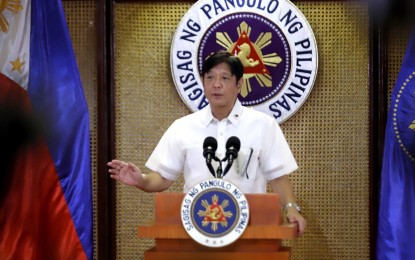Marcos' 1st edict abolishes PACC, Office of CabSec
MANILA – President Ferdinand “Bongbong” Marcos Jr. has issued an executive order (EO) abolishing the Presidential Anti-Corruption Commission (PACC) and the Office of the Cabinet Secretary (OCS) to achieve “simplicity, economy, and efficiency” in the bureaucracy.
Marcos signed EO 1 on June 30, the day he was sworn in as the country’s 17th president.
Press Secretary Trixie Cruz-Angeles confirmed the release of the EO in a text message to reporters.
In signing the EO, Marcos said the administration endeavors to achieve “a comprehensive and meaningful recovery through a just allocation of resources and a simplified internal management and governance of the Office of the President and its immediate offices and common staff support system.”
“In order to achieve simplicity, economy, and efficiency in the bureaucracy without effecting disruptions in internal management and general governance, the administration shall streamline official processes and procedures by reorganizing the Office of the President proper and the various attached agencies and offices, and by abolishing duplicated and overlapping official functions,” the EO reads.
Under the EO, the jurisdiction, powers, and functions of the PACC will be transferred to the Office of the Deputy Executive Secretary for Legal Affairs.
“The Deputy Executive Secretary for Legal Affairs shall promulgate rules of procedure in administrative cases under its jurisdiction; Provided that the existing rules of procedure in administrative cases promulgated by the Presidential Anti-Corruption Commission shall remain in force unless otherwise repealed or amended,” the EO reads.
The winding-up of the operations and disposition of the functions, positions, personnel, assets, and liabilities of the PACC will be administered by the Executive Secretary.
EO 1 also transfers the existing Cabinet Secretariat under the direct control and supervision of the Presidential Management Staff (PMS).
“The Cabinet Secretariat, in coordination with the Executive Secretary, shall assist the President in the establishment of agenda topics for Cabinet deliberations, or facilitate the discussion of Cabinet meetings,” the EO reads.
All personnel affected by the abolition of the PACC and OCS may be allowed to avail of the benefits provided under existing laws, if applicable.
The EO ordered the Department of Budget and Management (DBM) to release the corresponding fund as may be warranted, subject to existing civil service, budgeting, accounting, and auditing laws and rules.
Under EO 1, the Executive Secretary will exercise supervision, control, and oversight functions over all agencies and offices under and attached to the Office of the President.
“The Office of the Special Assistant to the President (OSAP), the Presidential Advisers and Assistants (PAA), and the Presidential Management Staff (PMS) shall coordinate with the Executive Secretary in providing staff support to the President,” the EO reads.
The OPSA and PMS must provide support and assistance to the Executive Secretary in the overall management of the development process.
EO 1 also creates an Office of the Presidential Adviser on Military and Police Affairs which will be under the administration of the OSAP.
All Presidential proclamations, orders, instructions, rules and regulations, and other enactments or parts that are in conflict with the provisions of the EO are modified or revoked.
In the event that any provision of the EO is held invalid or unconstitutional, the provisions not affected will remain in full force and effect.
The PACC, which was created under Executive Order No. 43 on Oct. 4, 2017, is the lead agency mandated to eliminate all forms of corruption in the Executive Department in close coordination with various government and law enforcement agencies.
The agency investigates and gathers evidence for referral to the Ombudsman against public officials accused of corruption.
It has established fact-finding investigations on cases, lifestyle checks for government employees and the creation of special investigating panels to curb corruption within the government. (PNA)
PNA Website
OTHER HUMAN RIGHTS PROMOTIONS WEBSITES
------------------------------------------------------------------------------------
PROTECTION AND PROMOTION OF HUMAN RIGHTS
-------------------------------------------------------------------------------------
------------------------------------------------------------
-----------------------------------
----------------------------







































